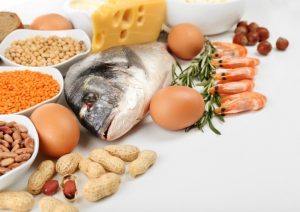Does Meat Protein Increase Heart Disease Risk?
Author: Dr. Stephen Chaney
Is a plant-based diet better than eating meat when it comes to protein and heart disease?
 There are a multitude of studies showing the long-term health benefits of plant-based diets. Among the best of these studies are the Seventh-Day Adventist Studies. That’s because the Adventist church advocates a vegan diet but allows personal choice. This means Seventh-Day Adventists eat a more plant-based diet than most Americans. However, there is also significant variation in the diet of Adventists.
There are a multitude of studies showing the long-term health benefits of plant-based diets. Among the best of these studies are the Seventh-Day Adventist Studies. That’s because the Adventist church advocates a vegan diet but allows personal choice. This means Seventh-Day Adventists eat a more plant-based diet than most Americans. However, there is also significant variation in the diet of Adventists.
Not all Adventists are vegans. Significant numbers of Adventists choose lacto-ovo-vegetarian (dairy, eggs & vegetarian), pesco-vegetarian (fish & vegetarian), and semi-vegetarian (meat & vegetarian).
Because of this variation, Adventists provide a rich database for clinical studies. You can compare health outcomes of a vegetarian diet to the standard American diet by comparing Adventists to the non-Adventist population living in the same area. You can also use the Adventist population to compare the health outcomes of the various types of vegetarian diets.
I have described the Adventist Health Studies in detail in my new book, Slaying The Food Myths. Let me briefly summarize the results with an emphasis on heart disease risk:
- Compared to the standard American Diet, vegetarian diets decrease cardiovascular deaths by 41% in men and 51% in women.
- The reduction in cardiovascular death is greater for vegans than for lacto-ovo-vegetarians.
- If we look at the average of multiple studies, the risk of heart disease, diabetes, and cancer is less for vegans than for lacto-ovo-vegetarians, which is less than the risk for pesco-vegetarians, which is less than the risk for semi-vegetarians, which is much less than the risk for people consuming the standard American diet.
There are multiple reasons why vegetarian diets decrease the risk of heart disease compared to the standard American diet. These will be discussed below. The current study was designed to look at the proteins found in vegetarian and non-vegetarian diets and ask what effect these proteins had on heart disease. This was a good study of protein and heart disease.
How Was The Study Done?
 This study (M. Tharrey et al, International Journal of Epidemiology, 2018, 1-10 doi: 10.1093/ije/dyy030 ) utilized a database of 81,337 men and women over age 25 who were enrolled in the Adventist Health Study-2 between 2002 and 2007.
This study (M. Tharrey et al, International Journal of Epidemiology, 2018, 1-10 doi: 10.1093/ije/dyy030 ) utilized a database of 81,337 men and women over age 25 who were enrolled in the Adventist Health Study-2 between 2002 and 2007.
At the time of enrollment, a very detailed food frequency questionnaire was administered. The participants were divided into groups based on the most prevalent protein source in their diet as follows:
- Grains: This group averaged 44% of their protein intake from grains.
- Processed foods: This category included protein from cheese, eggs, and milk. However, it also included processed plant proteins and protein from cold breakfast cereals.
- Meats: The largest protein contributors to this category were red meat, processed meat, and poultry. Fish made only a minor contribution.
- LFV (Legumes, fruits & vegetables): Legumes were the biggest protein contributors in this category.
- Nuts and seeds: This included peanuts, tree nuts and seeds.
The participants in the study were followed for an average of 9.4 years during which there were 2276 cardiovascular deaths. The study then asked what effect protein intake from each of these food groups had on cardiovascular risk.
Meat Protein and Heart Disease?
 Some of the findings from this study were expected, but some were surprising. When studying protein and heart disease for example:
Some of the findings from this study were expected, but some were surprising. When studying protein and heart disease for example:
- When they compared people getting the most protein from meat with those getting the least (24% versus 1% of their protein intake from meat), the risk of cardiovascular death was increased by 61%. This is consistent with several previous studies suggesting that meat, particularly red meat, increases the risk of heart disease.
- When they compared people getting the most protein from nuts and seeds with those getting the least (18% versus 2%), the risk of cardiovascular death was decreased by 40%. Again, this is consistent with previous studies suggesting that nuts and seeds reduce the risk of heart disease.
- They found no significant effect of protein intake from grains on cardiovascular death. This could be considered as surprising because whole grains are an excellent source of fiber, which reduces the risk of heart disease. However, the difference in protein intake between the groups getting the most protein from grains versus the least was relatively small (34% versus 19%). In addition, the study did not differentiate between whole grains and refined grains.
- There was a slight, but non-significant, increased risk of cardiovascular death for people getting the highest amount of protein from processed foods. This is also a bit surprising. It may be because the survey included both meat-based and vegetarian processed foods in the processed foods classification, and there are many processed foods that are marketed specifically to vegetarians.
- There was also no significant effect of protein from legumes, fruits and vegetables on cardiovascular death. This is also surprising and will be discussed below.
The authors concluded “Our results suggest that healthy choices can be advocated based on protein sources, specifically preferring diets low in meat intake and with a higher intake of plant proteins from nuts and seeds.”
What Does This Mean For You?
 This study does not fundamentally alter what we know about diet and heart disease risk. That is because this study focused solely on the protein and heart disease not on the foods and heart disease. The data were statistically corrected for every other beneficial and detrimental effect of those foods. For example:
This study does not fundamentally alter what we know about diet and heart disease risk. That is because this study focused solely on the protein and heart disease not on the foods and heart disease. The data were statistically corrected for every other beneficial and detrimental effect of those foods. For example:
- The people in this study with the highest intake of processed foods were more likely to be overweight and physically inactive. They were also more likely to be smokers. These factors increase the risk of cardiovascular disease. However, the data were statistically adjusted to remove these considerations from the analysis.
- The people in this study with the highest intake of whole grains, legumes, fruits and vegetables also had the highest intake of fiber, antioxidants, and B vitamins. These factors decrease the risk of heart disease. However, the data were statistically adjusted to remove these considerations from the analysis.
In short, processed foods are still probably bad for the heart, but that is not due to the protein component of processed foods. Similarly, whole grains, legumes, fruits, and vegetables are still good for the heart, but it is not the protein component of these foods that conveys the heart-healthy benefits.
Where the study breaks new ground and leaves some unanswered questions is with the effect of meat, nuts, and seeds on heart disease risk. For example:
- The American Heart Association has recently released a Presidential Advisory statement warning that the saturated fat in meats increases heart disease risk. However, the data in the present study were statistically adjusted to remove the effect of saturated fat from the analysis. Thus, this study suggests that the protein in red meat also contributes to heart disease risk. If this is confirmed by subsequent studies, it is an important advance. It might mean, for example, that grass-fed beef is no healthier than conventionally raised beef.
However, it is unclear why meat protein increases heart disease risk. One recent study has suggested that meat-based diets favor a population of gut bacteria that metabolize a compound called carnitine, also found in meat, into a metabolite that increases heart disease risk. However, this mechanism has not yet been confirmed.
[Note: The effects of saturated fats and carnitine on heart disease risk are covered in detail in my new book “Slaying the Food Myths.” In my book I carefully analyze the arguments of saturated fat proponents as well as saturated fat opponents.]
- Conventional wisdom has attributed the heart health benefits of nuts and seeds to their omega-3 fatty acids. However, the data in this study were statistically adjusted to remove the effect of omega-3 fatty acids from the analysis. Thus, this study suggests that the protein in nuts and seeds decreases heart disease risk.
Once again, the mechanism of this effect is unclear. The authors suggest it might be due to higher levels of the amino acids glutamate and arginine in seed and nut protein. However, these two amino acids are abundant in a variety of plant-based proteins. Their presence in nut and seed proteins would not appear to be sufficient to confer a special heart health benefit.
In short, this is the first study of this kind and the mechanisms of the effects described are unclear. Thus, one cannot yet definitively claim that meat protein is bad for the heart and nut and seed proteins are good for the heart.
Whether it is the protein component of these foods that affects heart health is relatively unimportant. It does not change what we know about diet and heart health. As discussed in “Slaying The Food Myths,” multiple studies show that meat-based diets increase heart disease risk and primarily plant-based diets decrease heart disease risk. Multiple studies also show that nuts and seeds decrease heart disease risk.
The Bottom Line:
A recent study looked at the effect of the protein content of various foods on heart disease risk. The study reported:
- Meat protein increased the risk of cardiovascular deaths by 61%.
- Proteins from nuts and seeds decreased the risk of heart disease deaths by 40%.
- Proteins from processed foods, grains, legumes, fruits, and vegetables had no effect on cardiovascular deaths.
This study does not fundamentally alter what we know about diet and heart disease risk. That is because this study focused solely on the protein component of various foods rather than the foods themselves. The data were statistically corrected for every other beneficial and detrimental effect of those foods. Because of that:
- Processed foods are still probably bad for the heart
- Whole grains, legumes, fruits and vegetables are still good for the heart.
- Meat, especially red meat, is probably bad for the heart, while nuts and seeds are good for the heart.
The major new information provided by this study is that:
- The increased risk of heart disease associated with meats is not just due to their saturated fat content. Meat protein may also increase heart disease risk. If confirmed by subsequent studies, this is an important finding because it suggests that lean cuts of meat and grass-fed beef may not eliminate heart disease risk.
- The decreased risk of heart disease associated with nuts and seeds is not just due to their omega-3 content. Nut and seed proteins may also decrease heart disease risk.
For more details, read the article above:
These statements have not been evaluated by the Food and Drug Administration. This information is not intended to diagnose, treat, cure or prevent any disease.
